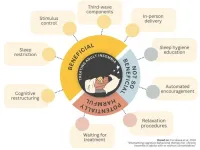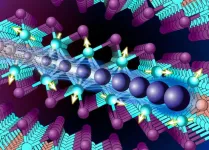(Press-News.org) Cleveland Clinic researchers have successfully developed a therapeutic peptide that blocks aggressive cancer cells from multiplying rapidly. The results highlight a potential new strategy for developing targeted treatments for triple-negative breast cancer, which currently has no approved options.
Targeted drugs attack cancer cell functions directly, offering a more precise approach to complement broader treatments like chemotherapy. A research team led by Ofer Reizes, PhD, and Justin Lathia, PhD, designed a peptide therapeutic that disrupts the molecular processes behind aggressive cancer growth when delivered into cells.
The drug stopped cancer growth and induced tumor cell death, and only affected cancerous cells in preclinical work. The study was highlighted in the January issue of Molecular Cancer Therapeutics.
"It's devastating that we currently have such limited options to help people with triple-negative breast cancer," says Dr. Reizes, the Laura J. Fogarty Endowed Chair for Uterine Cancer Research. "We want our results to offer hope for these patients and their families and serve as a starting point to get more treatments into the development pipeline."
Peptides are short proteins made up of amino acids that are the "building blocks" of larger proteins. Natural and artificially synthesized proteins are commonly used to treat disease. Some peptides are used to supplement existing proteins in the body, like insulin in people with diabetes.
The peptide in development, based on a 2018 Cleveland Clinic discovery, serves as a proof-of-concept for this type of drug for triple-negative breast cancer.
Because triple-negative breast cancer cells lack certain receptors, drugs designed to treat other subtypes of breast cancer won't work. There are currently no targeted drugs approved for triple-negative breast cancer, which makes up 15% of breast cancer cases. To develop new drugs, investigators needed to identify new, effective targets.
A previous joint postdoctoral fellow with Dr. Reizes and Dr. Lathia's team found Cx26, a type of protein called a connexin, forms a molecular complex in triple-negative breast cancer cells that makes them more likely to recur or spread through the body. Investigators worked to find a way to disrupt that complex, which would limit the cancerous properties of the cells.
First authors Erin Mulkearns-Hubert, PhD, and Emily Esakov Rhoades, PhD, developed a peptide therapeutic, supported by a Department of Defense grant. The peptide's sequence is the same as the component of Cx26 necessary for the complex to form. The goal is to saturate the system with the peptide and interrupt the ability of the full-length proteins to bind, says Dr. Mulkearns-Hubert, a research associate in the Lathia lab.
"The peptide's design was actually relatively straightforward and worked beautifully, slowing tumor growth in preclinical models," she says. "Triple-negative breast cancer remains an incredibly difficult tumor type to treat, so developing and verifying strategies like this peptide's design is critical to moving forward."
Researchers observed that the drug prevented cancer stem cells in a dish from self-renewing, a characteristic of aggressive cancer cells that supports treatment resistance. The team is now working with Cleveland Clinic Innovations to develop the drug and explore potential for clinical trials.
END
New research highlights unprecedented targeted approach to treating triple-negative breast cancer
A peptide drug candidate based on a Cleveland Clinic discovery disrupted cancer growth and self-renewal
2024-01-17
ELSE PRESS RELEASES FROM THIS DATE:
ASBMB names Mona V. Miller as next executive officer
2024-01-17
The American Society for Biochemistry and Molecular Biology today named Mona V. Miller its next chief executive officer, effective April 1.
Miller is an experienced association leader with significant experience in strategic planning, advocacy and fundraising. Most recently, she was CEO of the American Society of Human Genetics. Before that she held multiple high-level positions at the Society for Neuroscience.
Miller said she was drawn to the ASBMB because “scientifically, biochemistry and molecular biology is at the forefront of knowledge that is transforming health and society.”
She said she looks forward to “focusing on the pivotal ...
Streamlining cognitive behavioral therapy for chronic insomnia
2024-01-17
A combination of cognitive and behavioral strategies, ideally delivered in person by a therapist, maximizes the benefits of cognitive behavioral therapy for insomnia (CBT-I), according to new research. CBT-I is a form of talk therapy, which can be delivered in person or through self-help guides. By analyzing 241 studies, involving over 30,000 adults, researchers identified the most beneficial components of CBT-I. These included: cognitive restructuring, third-wave components, sleep restriction, stimulus control and in-person delivery. Self-help with human encouragement could also be beneficial, while waiting for active treatment and enforcing ...
Prenatal opioid exposure and immune-related conditions in children
2024-01-17
About The Study: Prenatal opioid exposure was associated with an increased risk of infection, eczema and dermatitis, and asthma, but not allergies and anaphylaxis or autoimmune conditions in this study of 401,000 neonates. These findings highlight the importance of further study of opioid-induced immune changes during pregnancy, the potential impact on long-term health in exposed children, and the mechanisms of opioid-induced immune dysregulation.
Authors: Erin Kelty, Ph.D., of the University of Western Australia in Crawley, Western Australia, ...
Comparative effectiveness of psychotherapy vs antidepressants for depression in heart failure
2024-01-17
About The Study: In this comparative effectiveness trial of behavioral activation psychotherapy (BA) and antidepressant medication management (MEDS) in 416 patients with heart failure experiencing depression, both treatments significantly reduced depressive symptoms by nearly 50% with no statistically significant differences between treatments. BA recipients experienced better physical health-related quality of life, fewer emergency department visits, and fewer days hospitalized. The study findings suggest that patients with heart failure could be given the choice between BA or MEDS to ameliorate depression.
Authors: Waguih ...
Origin of intense light in supermassive black holes and tidal disruption events revealed
2024-01-17
A new study by Hebrew University is a significant breakthrough in understanding Tidal Disruption Events (TDEs) involving supermassive black holes. The new simulations, for the first time ever, accurately replicate the entire sequence of a TDE from stellar disruption to the peak luminosity of the resulting flare. This study has unveiled a previously unknown type of shockwave within TDEs, settling a longstanding debate about the energy source of the brightest phases in these events. It confirms that shock dissipation powers the brightest weeks ...
Astronomers detect oldest black hole ever observed
2024-01-17
Researchers have discovered the oldest black hole ever observed, dating from the dawn of the universe, and found that it is ‘eating’ its host galaxy to death.
The international team, led by the University of Cambridge, used the NASA/ESA/CSA James Webb Space Telescope (JWST) to detect the black hole, which dates from 400 million years after the big bang, more than 13 billion years ago. The results, which lead author Professor Roberto Maiolino says are “a giant leap forward”, are reported ...
Columbia chemists create the first 2D heavy fermion
2024-01-17
Researchers at Columbia University have successfully synthesized the first 2D heavy fermion material. They introduce the new material, a layered intermetallic crystal composed of cerium, silicon, and iodine (CeSiI), in a research article published today in Nature.
Heavy fermion compounds are a class of materials with electrons that are up to 1000x heavier than usual. In these materials, electrons get tangled up with magnetic spins that slow them down and increase their effective mass. Such interactions are ...
Therapy versus medication: comparing treatments for depression in heart disease
2024-01-17
New research by investigators from the Department of Psychiatry and Behavioral Neurosciences at Cedars-Sinai shows that behavioral activation therapy is as effective as antidepressant medications in treating symptoms of depression in patients with heart failure.
Heart failure affects nearly 6 million adults in the United States, and approximately 50% of heart failure patients experience symptoms of depression along with their condition. Past studies show patients with heart failure and depression have lower cardiac function, more emergency department ...
Active membranes: The future of fresh water is bright
2024-01-17
The growth of Los Angeles as a startup hub is highlighted by a robust and diverse entrepreneurial ecosystem within UCLA. The Magnify Incubator at CNSI is no exception to showcasing the range of early-stage businesses.
One such company within the Magnify incubator, Active Membranes, is innovating the future of fresh water through membrane desalination. As freshwater is becoming increasingly scarce around the globe, resources such as seawater and industrial wastewater are costly to procure and operate. The company’s patented technology is electrically conducting ...
What’s stopping US climate policies from working effectively
2024-01-17
In an effort to reduce greenhouse gas emissions and curb global warming, the U.S. has enacted several ambitious federal laws, such as the Inflation Reduction Act (IRA) passed in 2022 and the Infrastructure Investment and Jobs Act (IIJA) of 2021.
These provide significant investments in clean energy projects and encourage technological innovations. Some analyses suggest they could reduce greenhouse gas emissions by more than 40% below 2005 levels by 2030.
However, in a paper published Jan. 16 in the journal Nature Climate Change, researchers at the University ...
LAST 30 PRESS RELEASES:
Iron deficiency blocks the growth of young pancreatic cells
Selective forest thinning in the eastern Cascades supports both snowpack and wildfire resilience
A sea of light: HETDEX astronomers reveal hidden structures in the young universe
Some young gamers may be at higher risk of mental health problems, but family and school support can help
Reduce rust by dumping your wok twice, and other kitchen tips
High-fat diet accelerates breast cancer tumor growth and invasion
Leveraging AI models, neuroscientists parse canary songs to better understand human speech
Ultraprocessed food consumption and behavioral outcomes in Canadian children
The ISSCR honors Dr. Kyle M. Loh with the 2026 Early Career Impact Award for Transformative Advances in Stem Cell Biology
The ISSCR honors Alexander Meissner with the 2026 ISSCR Momentum Award for exceptional work in developmental and stem cell epigenetics
The ISSCR honors stem cell COREdinates and CorEUstem with the 2026 ISSCR Public Service Award
Minimally invasive procedure effectively treats small kidney cancers
SwRI earns CMMC Level 2 cybersecurity certification
Doctors and nurses believe their own substance use affects patients
Life forms can planet hop on asteroid debris – and survive
Sylvia Hurtado voted AERA President-Elect; key members elected to AERA Council
Mount Sinai and King Saud University Medical City forge a three-year collaboration to advance precision medicine in familial inflammatory bowel disease
AI biases can influence people’s perception of history
Prenatal opioid exposure and well-being through adolescence
Big and small dogs both impact indoor air quality, just differently
Wearing a weighted vest to strengthen bones? Make sure you’re moving
Microbe survives the pressures of impact-induced ejection from Mars
Asteroid samples offer new insights into conditions when the solar system formed
Fecal transplants from older mice significantly improve ovarian function and fertility in younger mice
Delight for diastereomer production: A novel strategy for organic chemistry
Permafrost is key to carbon storage. That makes northern wildfires even more dangerous
Hairdressers could be a secret weapon in tackling climate change, new research finds
Genetic risk for mental illness is far less disorder-specific than clinicians have assumed, massive Swedish study reveals
A therapeutic target that would curb the spread of coronaviruses has been identified
Modern twist on wildfire management methods found also to have a bonus feature that protects water supplies
[Press-News.org] New research highlights unprecedented targeted approach to treating triple-negative breast cancerA peptide drug candidate based on a Cleveland Clinic discovery disrupted cancer growth and self-renewal




